
James O'Brien 10am - 1pm
9 March 2023, 07:01 | Updated: 9 March 2023, 08:15
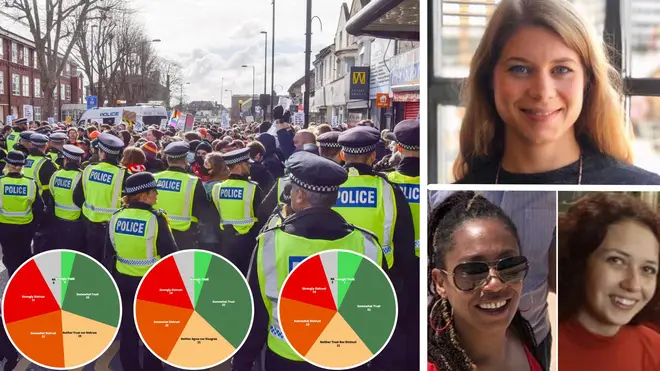
Only four in ten Londoners still trust the Metropolitan Police, damning new figures for LBC reveal – with a mere 4% of young women saying they have a high level of faith in the force.
In the wake of years of scandals and revelations about dangerous, racist and misogynistic cops in the force, fresh polling lays bare how tarnished its reputation is in the capital.
Of LBC's representative sample of more than 1,000 Londoners, compiled in conjunction with the polling company JL Partners, just 39% said they could either strongly (7%) or somewhat trust (32%) the Met while 35% said they strongly or somewhat distrust it.
A further 21% could not say either way, while 5% said they did not know - meaning effectively six out of ten Londoners cannot say they trust it.
Alarmingly for the Met, this represents a sharp rise in distrust compared to polling conducted in December 2021, towards the end of Dame Cressida Dick's time as Commissioner, when only 23% of Londoners registered their distrust. Breaking the data down further, among women 37% could trust the force while 36% could not. A total of 21% said they could neither trust nor distrust it.
The force's head of anti-corruption told LBC the figures were hard to hear, but important - and admitted while the Met is in a "bad place", top cops are determined to turn it around.
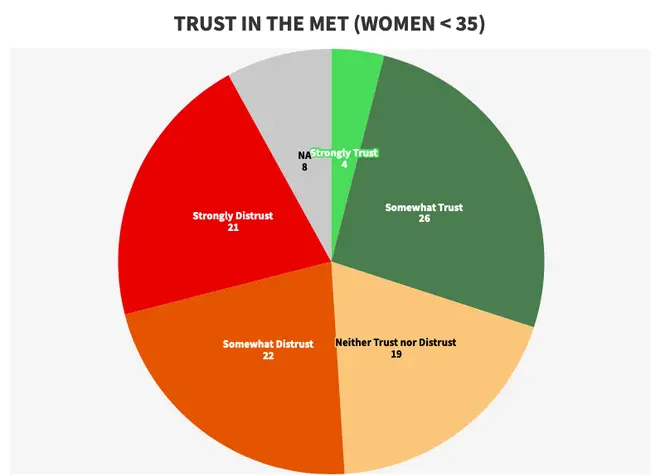
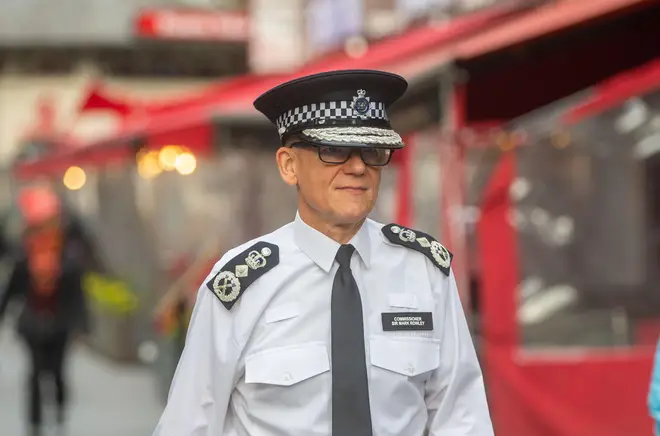
But it will be the trust among young women that will perhaps be of greatest concern. Of those under 35, only 4% could say they strongly trust the Met, while 26% said they could somewhat trust it.
That leaves seven out of 10 women under the age of 35 unable to say they trust their city's police ahead of the publication of Baroness Louise Casey's report into misconduct in the Met, commissioned following the kidnap, rape and murder of Sarah Everard by Wayne Couzens, a serving officer in the parliamentary and diplomatic protection group.
Among women, 37% could trust the force while 36% could not. A total of 21% said they could neither trust nor distrust it.
Among men, 41% have trust in the Met while 33% do not, and 21% could not say either way.
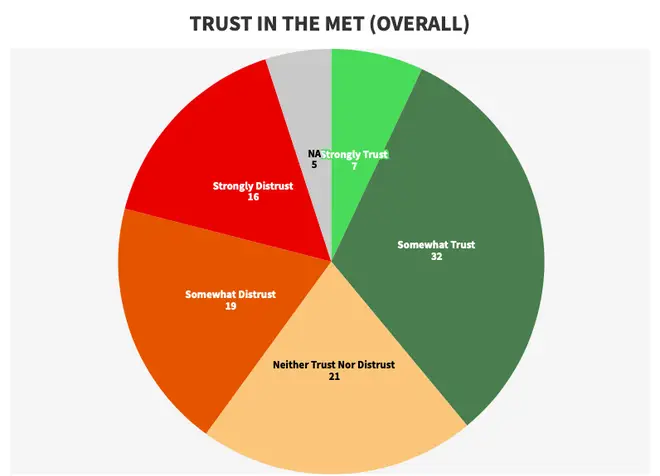
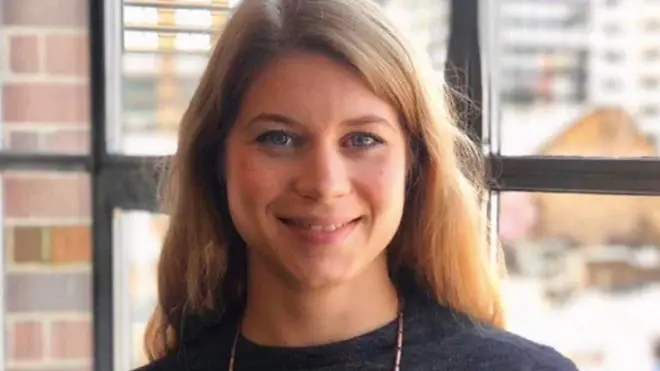
While 36% of men under 35 saying they had at least some level of trust in the Met, 55% were unable to say they had any.
That contrasts sharply with both men and women over the age of 55, where nearly half of either demographic said they had faith in the force.
Among men in that age group, 47% trusted the Met, with just 28% saying they did not.
Trust in the force was even slightly higher in women aged 55 or above, with 49% saying they had trust. Just 21% said they did not.
Putting both genders into age groups, people aged 25-34 had the lowest trust in the force, with just 32% trusting – marginally lower than the 33% reported by the 18-24 group.
Of people aged 25-34, 41% did not trust it, while 38% of people in the younger age group said the same.
But for people aged 55-64, 50% could trust the force, while 48% of people 65 and above trusted the Met.
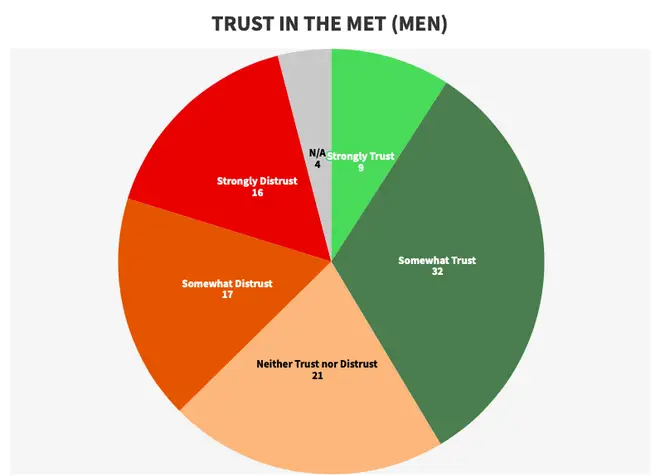

Notably, there was also a massive difference in trust based on Brexit voting lines.
51% of people who voted leave said they had trust in the Met, and 23% did not, while just 34% who voted remain could say they trusted it and 45% could not.
Commander James Harman, the head of anti-corruption and abuse command at the Metropolitan Police, told LBC's Nick Ferrari at Breakfast: "That survey is obviously hard to hear. But it's really important to hear also.
"And we in the Met are absolutely determined to put this right for Londoners, and we’re doing a number of things now, and there’s a number of things to come to turn that around."
He said the Met has already implemented an anti-corruption hotline, allowing hundreds of people so far to call the force and report corruption.

Top cop admits Met is in 'bad place' but pledges for will turn things around
The force is carrying out intelligence checks on staff and tougher vetting.
"I can say to you now that officers accused of very serious offences should expect to be suspended while those are investigated and officers found guilty of offences should expect a much more robust approach than maybe we've seen in some cases in the past, and in many cases will definitely lose their jobs," he said, adding there are "many excellent" staff in the Met and that Londoners should trust them.
"We're in a bad place now, we recognise that, but we are going to turn it around and we are determined to do so."
The deputy mayor of London for policing and crime, Sophie Linden, said: "A series of appalling scandals have not only exposed deep cultural problems within the Met, but have damaged the confidence of Londoners in our police service. As the Mayor and I have been saying for some time, Londoners deserve better.
"The Mayor has ensured that the Met is now set on a path of far-reaching systematic and cultural reform, with the appointment of a new Commissioner who acknowledges the scale of the problems within the police and is committed to raising standards, rebuilding trust and ridding the force of those individuals who are not fit to serve.
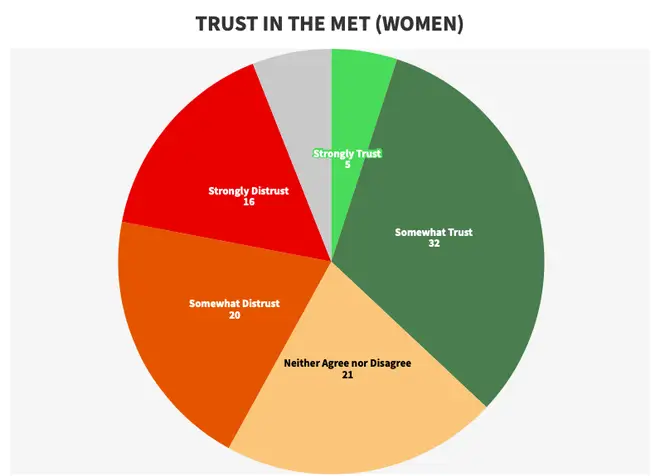
"We will continue to hold the Met to account and support the Commissioner to ensure we see the step-change in culture, standards and performance that’s so desperately needed – not only to regain trust in the police, but to help build a safer London for everyone."
Sarah Jones, Labour's shadow police minister, said the findings were "shocking".
"It's up to us, politicians and the police to get this right and fix it so you get the service you deserve. But I would hate to think that people wouldn’t go to the police when they need to," she told LBC's Nick Ferrari at Breakfast.
The distrust in the Met will pile more pressure on the force, and its commissioner Sir Mark Rowley - who marks six months in the job this weekend - to carry out reforms. One in five Londoners believed they would be better off scrapping it and replacing it altogether.
Sir Mark has not shied away from admitting there is a long road ahead and he has vowed to root out corrupt cops and those whose values are not compatible with policing London.
He has set out a "turnaround plan" designed to reduce crime and ensure high standards within the next two years.
"I am determined to win back Londoners' trust," he said as he launched it in January.
"We can succeed because of the dedicated, honest, often heroic, men and women who are the great majority of the Met."
The damage to trust in the Met follows a series of high-profile scandals including the Everard case and the conduct of two police officers, Deniz Jaffer and Jamie Lewis, who took pictures of the corpses of Bibaa Henry and Nicole Smallman after their murders and posted them to WhatsApp.
Mina Smallman, their heartbroken mother, has become one of the most prominent critics of the force and one of the most vocal campaigners for change.
And enquiries into the standards of officers in the Met has uncovered racism and misogyny among its ranks, with officers in a group with Couzens making jokes about rape and domestic violence, while disturbing messages emerged in group chats made up of some police based at Charing Cross.
Most recently, David Carrick, a former Met cop, was found guilty of 24 counts of rape. He managed to stay on as a diplomatic protection officer despite suggestions there were a number of chances to catch him.
Sir Mark has vowed to root out those who fail to meet the Met's standards but admitted it is impossible to completely purge the force of bad cops.